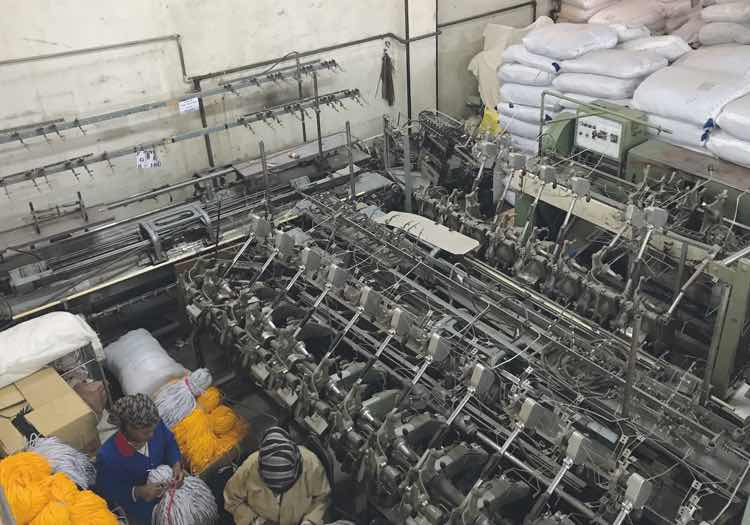Reutlingen - Stoll's customer base in Africa has extended over the years and now includes clients in Ethiopia, Uganda, Ghana and Zimbabwe.
The main industries in Ethiopia are garment and leather shoe manufacturing, along with agricultural products such as coffee, all of which are industries that are mainly driven by foreign investment.
Many local companies are unable to play major roles in these industries, primarily due to a lack of foreign currencies and a lack of economic growth and wealth, preventing them from investing.
While two of the country's major banks are keen to help with leasing schemes for they too are hindered by the lack of foreign currencies, making it nearly impossible to invest in machines.
A further handicap for local companies, and even foreign companies, is that, so far, no foreign banks are allowed in Ethiopia.
Even though the textile manufacturing sector has been named as a 'number one' priority for the country, there are still many obstacles to overcome. Qualified and well-trained people are not yet available to the extent required meaning that foreign investors have to make use of expensive expats for long periods in order to get their businesses up and running.
This, says Stoll, is where it comes into the picture. The Reutlingen-based firm has been the first manufacturer of electronic flat knitting machines to supply two state-of-the-art CMS machines, along with two design software M1plus systems to the Textile Institute of Bahir Dar University Education, offering training as a base for the future prosperity of the flat knitting industry in Ethiopia.
Today, Bahir Dar University is educating roughly 3,000 students, a figure that is expected to double within the next 5 years.
The University is currently constructing a “Mega Textile City” within its campus with the aim of educating and producing knitted textiles.
Bahir Dar wants to become the biggest University in Africa for applied textile sciences as well as one of the biggest textile producers and it is here that Stoll will have a vital part in the flat knitting sector. "This way, we can assist in further education/training as well as in production of flat knitted items," Stoll says. "The Ethiopian government is attracting foreign investors with an exemption of income/profit tax, duty free import/export possibilities and quota free export to the US and Europe (for textiles)."

In addition, Ethiopia is selling energy at the lowest rate in the area and is building huge industrial estates country wide. The railroad from Addis to Djibouti and the extension of the Hawassa cargo airport (direct flights to Saragossa in Spain will be made available) are part of the development of infrastructure in the country. Hawassa industrial zone is already one of the biggest zones in the country and the first international companies are moving in.
"The system of incentives will definitely attract all kinds of foreign manufacturing companies, at least for the period of the incentives, which is between 7-10 years respectively," adds Stoll. "The government is aware that these companies will move, once the incentives are not available anymore, but hopes, that until then, the local industries have grown in such a way that substitutes the foreign companies. But, to achieve that, money has to be made available. There is still a long way to go, but this is possible to achieve with the new Prime Minister. Stoll is represented locally and is consistently monitoring the situation."
Uganda
Stoll's customer activity in Kenya means that the flat knitting machine builder is also aware of a burgeoning industry in neighboring Uganda with the company able to discover potential customers from its knowledge of the yarn trade.
As in all East-African countries, school uniforms are a must for children and students. As such, flat knitted sweaters and cardigans are part of the equipment. At the moment, Stoll notes that everything is knitted on hand flat or semi-automatic machines.
"Knitters were more than impressed when we showed them how to knit fronts, backs and sleeves completely shaped," says Stoll. "No waste means saving around 30 per cent of yarn in comparison with the semi-automatic machines. In addition, the productivity and reliability of a computerized flat knitting machine speaks for itself. Customers calculated quickly how much money they could save per year and, conclusively, the investment in computerized machines became cost effective.
"This is not limited to school students but also churches, hospitals, military and police sectors, and all government related industries that are in need of knitted sweaters. The potential is huge and has to be developed step-by-step."
Ghana
Stoll installed its first two CMS 530 HP machines in Ghana this year for a Catholic Diocese which is using the machines to manufacture sweaters and other garments.
'Getting the local technicians trained was a big challenge," says Stoll, "as they had no knowledge about knitting but, within a few weeks, they were ready to program and knit."
Zimbabwe
Economically speaking, Zimbabwe is far behind its neighbor South Africa. Again, there no shortage of labour but there is a lack of foreign currency. "Nevertheless, we have customers in Zimbabwe equipped with the latest CMS technology," says Stoll. "And these customers are moving on steadily, but it always takes time to get the money released. But they are confident that, with the new government, things will become easier in the future. Stoll is handled in Zimbabwe by our South African agent, a combination that has proved to be very successful."